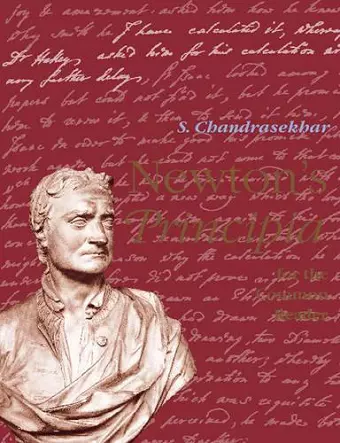Newton's Principia for the Common Reader
Format:Paperback
Publisher:Oxford University Press
Published:3rd Apr '03
Currently unavailable, and unfortunately no date known when it will be back
This paperback is available in another edition too:
- Hardback£320.00(9780198517443)

Newton's Philosophiae Naturalis Principia Mathematica provides a coherent and deductive presentation of his discovery of the universal law of gravitation. It is very much more than a demonstration that 'to us it is enough that gravity really does exist and act according to the laws which we have explained and abundantly serves to account for all the motions of the celestial bodies and the sea'. It is important to us as a model of all mathematical physics. Representing a decade's work from a distinguished physicist, this is the first comprehensive analysis of Newton's Principia without recourse to secondary sources. Professor Chandrasekhar analyses some 150 propositions which form a direct chain leading to Newton's formulation of his universal law of gravitation. In each case, Newton's proofs are arranged in a linear sequence of equations and arguments, avoiding the need to unravel the necessarily convoluted style of Newton's connected prose. In almost every case, a modern version of the proofs is given to bring into sharp focus the beauty, clarity, and breath-taking economy of Newton's methods. Subrahmanyan Chandrasekhar is one of the most reknowned scientists of the twentieth century, whose career spanned over 60 years. Born in India, educated at the University of Cambridge in England, he served as Emeritus Morton D. Hull Distinguished Service Professor of Theoretical Astrophysics at the University of Chicago, where he has was based from 1937 until his death in 1996. His early research into the evolution of stars is now a cornerstone of modern astrophysics, and earned him the Nobel Prize for Physics in 1983. Later work into gravitational interactions between stars, the properties of fluids, magnetic fields, equilibrium ellipsoids, and black holes has earned him awards throughout the world, including the Gold Medal from the Royal Astronomical Society in London (1953), the National Medal of Science in the United States (1966), and the Copley Medal from the Royal Society (1984). His many publications include Radiative transfer (1950), Hydrodynamic and hydromagnetic stability (1961), and The mathematical theory of black holes (1983), each being praised for its breadth and clarity. Newton's Principia for the common reader is the result of Professor Chandrasekhar's profound admiration for a scientist whose work he believed is unsurpassed, and unsurpassable.
...a continuing source of pleasure, and a permanent reminder of its author, whom it was a privilege to know. * L. Mestel, Observatory *
...a very individual account, in which Chandrasekhar brings understanding, expertise, and sensitivity to bear on the problems of revealing Newton to the 'common reader'. The common reader must be prepared to work hard, however, though the rewards are great for the one who does so. * R. Penrose, Times Higher Education Supplement *
The great joy of Chandrasekhar's book is that it repays all the attention one gives it...The veil of Newtonian obscurity is lifted and one begins to grasp the extent of Newton's achievement. * D. Hughes, Nature *
ISBN: 9780198526759
Dimensions: 250mm x 165mm x 40mm
Weight: 1275g
618 pages